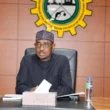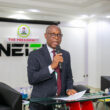By Izuchukwu Mayor, Lagos
A Former Minister of State for Mines and Steel Development, Uche Ogah, has called on the Federal Government to address some critical risks to boost Nigeria’s energy security and sustainability.
Dr. Ogah, also the President, Masters Energy Group, spoke yesterday at the Nigeria Association of Energy Correspondents (NAEC) Conference 2025, themed: “Nigeria’s Energy Future: Exploring Opportunities and Addressing Risks for Sustainable Growth,” which was held at the Eko Hotel & Suites, in Lagos.
The former minister, who was also the Chairman of the Conference, listed such risks to include:
- Investment risk in terms of policy consistency, regulatory harmony, and streamlining of approvals;
- Infrastructure risk – grid modernization, pipeline & processing expansion, and decentralised systems to promote microgrids in off grid region;
- Security risk through community engagement via “benefit sharing agreements”, integrated security framework for oil fields, and technology-driven surveillance through drone deployment for monitoring and satellite-based leak detection to spot illicit activities before they cause major disruption;
- Human capital risk by reskilling the workforce, including launching a National Energy Transition Academy offering certifications in renewable engineering, hydrogen technology, and ESG compliance, investment in STEM and innovation culture, and industrial harmony, as industrial unrest such as recently witnessed in the case of PENGASSAN versus Dangote Refinery poses a human capital risk to national energy development.
Success will demand a pragmatic, multi-pronged strategy that leverages our strengths while confronting our vulnerabilities head on.
To tackle these risks, Mr Ogah called for collective and a new model of collaboration involving the industry, government and the media as a form of Unified National Project, which he said “requires aligned effort across sectors, regions, and generations.”
He argued that such a nationalistic project becomes imperative given that current reforms in the energy sector, which have not really impacted Nigerians as expected.
He said that these reforms came about through the Petroleum Industry Act (PIA) 2021; fuel subsidy removal in 2023, and the Electricity Act 2023 “that is redefining how power is generated, transmitted, and consumed.”
But still, he said: “three major energy challenges remain daunting for Nigeria today:
“First is ensuring that the energy and power reforms deliver tangible promised results to justify the reforms; second challenge is maximising the value of our hydrocarbon endowment before it declines; and third is delivering universal, accessible and affordable energy to every Nigerian household.”
According to Mr Ogah, “Nigeria’s energy future is not a choice between opportunity and risk; it is a challenge to navigate both dynamics together,” adding that “Success will demand a pragmatic, multi-pronged strategy that leverages our strengths while confronting our vulnerabilities head on.”
Earlier, NAEC Chairman, Ugo Amadi, noted that while this theme of this year’s conference may sound ordinary, it however underscores the fact that until Nigeria is able to resolve the challenges impeding the effective and efficient use of its abundant natural and human resources for the benefit of all Nigerians, such a theme will continue to resonate.
Founded in 1987, Mr. Amadi said the Association has grown from being an interest assembly of journalists covering the sector, to becoming an advocacy group for promoting transparency and accountability to encourage local and foreign investments in Nigeria’s energy industry.








